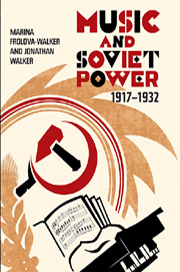Book contents
- Frontmatter
- Contents
- Preface
- Acknowledgements
- Note on transliteration
- Chronology of Political and Musical Events
- October 1917–18: Out of Chaos
- 1919: Depression and Fever
- 1920: Bureaucracy on the Rise
- 1921: Should I stay or should I go?
- 1922: Just Like the Old Days?
- 1923: The Birth of ASM and RAPM
- 1924: ASM in the Ascendant
- 1925: Equilibrium
- 1926: Guests from the West
- 1927: Celebrations
- 1928: At the Crossroads
- 1929: Velikiy perelom – The Great Turning Point
- 1930: RAPM's Glorious Year?
- 1931: RAPM's Fortunes Turning
- 1932: The Rules Change
- Key to Acronyms and Institutional Bodies
- Glossary of Names
- Bibliography
- Index
1930: RAPM's Glorious Year?
Published online by Cambridge University Press: 05 April 2013
- Frontmatter
- Contents
- Preface
- Acknowledgements
- Note on transliteration
- Chronology of Political and Musical Events
- October 1917–18: Out of Chaos
- 1919: Depression and Fever
- 1920: Bureaucracy on the Rise
- 1921: Should I stay or should I go?
- 1922: Just Like the Old Days?
- 1923: The Birth of ASM and RAPM
- 1924: ASM in the Ascendant
- 1925: Equilibrium
- 1926: Guests from the West
- 1927: Celebrations
- 1928: At the Crossroads
- 1929: Velikiy perelom – The Great Turning Point
- 1930: RAPM's Glorious Year?
- 1931: RAPM's Fortunes Turning
- 1932: The Rules Change
- Key to Acronyms and Institutional Bodies
- Glossary of Names
- Bibliography
- Index
Summary
It was the best of times (for RAPM), it was the worst of times (for all others). RAPM started the year by publishing a list of its campaigning successes, couched, as usual, in military terms.
We have made decisive strikes on the reactionary group of musicians that dominated the most important musical institutions (the concert organisations, the Conservatoire and the opera houses). […] We destroyed a petit-bourgeois music organisation (ORKiMD) […] that was standing on an opportunist platform.
They had also delivered a mortal blow against the NEPmen and their ‘light genre’ music: there was now a ban – so they claimed – on the publishing and performance of this ‘musical pornography and opium’. Readers of music journals this year had a choice of either Proletarian Musician (Proletarskiy muzïkant) or For Proletarian Music (Za proletarskuyu muzïku). Both allowed readers to keep abreast of RAPM's latest ideas and conquests.
This has been the standard view of the period: RAPM triumphant, having either absorbed or destroyed its rivals. And yet two years later, the organisation no longer existed and many of the defeated musical reactionaries and opportunists were managing very well for themselves. On the surface, RAPM's position looked unassailable, but it was dependent on the Party, which always kept its distance. RAPM never became the Party's music-policy arm, and the same was true of the proletarian organisations in the other arts.
- Type
- Chapter
- Information
- Music and Soviet Power, 1917–1932 , pp. 261 - 283Publisher: Boydell & BrewerPrint publication year: 2012



